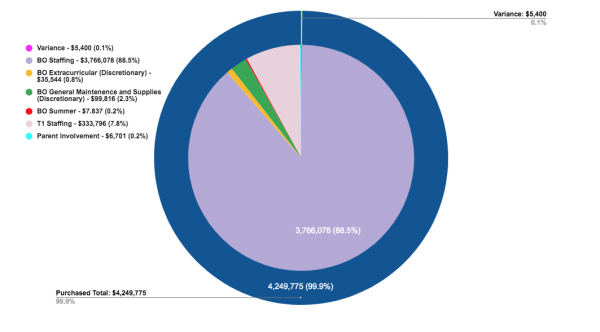
Alma K-G
In the spring of the 2023-2024 school year, Saul’s principal Samuel Howell and 9th-grade math teacher Heather Tanner visited George Washington Carver High School to observe students using VR goggles. They saw students participating in the lessons and decided to get a classroom set for their math and science departments, costing around $30,000, which was covered by funds added into the school budget late last year after a teacher quit over the summer of 2023.
“I love the VR headset,” said Kahane Williams, a 10th-grade animal science major who uses the goggles in Biology this year. “You get to interact with things more often instead of just learning off a paper or looking at a book.”
Purchasing decisions have been on the minds of Saul staff this spring as admin worked to set the next school year’s budget.
As an Ag school, Saul has two different budgets: a CTE budget and a non-CTE budget, both regulated by the school district. The non-CTE budget for Saul this school year was around 4.2 million dollars and is split into two main categories: Operating and Grants.
Operating
These funds come from taxes at the city and state level and are determined by the school district. The amount that every school is given depends on the enrollment number. This fund then breaks up into Discretionary and Mandatory Purchases. The district controls the mandatory portion of the budget, which tells the principal what they need to run the school, like staff numbers. After all the staffing positions are filled, if there is any, the amount of Discretionary funds is the leftover money. This money can be used for things like supplies or travel.
Grants
The main grant given to the schools in the School District of Philadelphia is Title One, federal money which is determined by the presence of students whose families are considered low-income. There is also a district Title One, which can pay for things that support populations with more marginalized students, like food for after-school programs.
About 97% of the entire non-CTE budget for Saul goes to pay for teachers and other staff. The remaining 3%, around $150,000, goes to general materials and supplies, extracurriculars, and money for staff working over the summer. Of this money, Principal Howell has full discretion over the extracurricular and general materials and supplies.
School District budgets are not allowed to have any variance money; all funds have to have somewhere to go.
Last year, Jacob Turko, who was a Program Coordinator at Saul, took a horticulture teaching position after one opened at the end of the year, when the previous teacher left. By leaving the Program Coordinator position unfilled, Howell gained approximately $80,000 of “discretionary” money to be used for supplies for teachers or extra pay for staff who helped with things like Country Fair Day.
The CTE budget at Saul comes from Perkins, a federal grant, which provided the district with 5.4 million dollars this school year. Perkins funds can be used to purchase supplies for Ag classrooms, like a coat for a calf or needles, as well as supplies that sustain the operation of the farm, like food for the culinary arts or bull semen for animal science. The Perkins grant is based on student enrollment. Saul received close to $190,000.
However, not all the money from the Perkins grant is distributed right away to the schools. Some money is left over in case of an emergency that might come up over the school year. One example would be a medical emergency that requires an animal to stay at the vet for a few days.
Non-CTE School Budget Pie Chart

Within Saul’s budget, there are student activity accounts that can earn and spend money throughout the year. Most of these student activities require the funds to go right back into the cause the money was collected for. For example, money collected for graduation can only be spent on things like caps and gowns.
The other type of student activity account at Saul is production. This money is allowed to be spent on the original cause and anything that needs more money. Some of the money this year for the cheese production went into buying feed for the beef steers that were here. The money from selling the steers will go into a new or repurposed student activity slot for next year’s feed for other steers.
When schools want improvements made to their buildings and facilities, they can ask for funds or materials from the district. However, the district doesn’t always honor these requests. Saul was given a grant by the Office of Athletics to redo the gym floor. This year, they also acquired the new tables for the Multi-purpose Room from another school.
Looking at the 2025-2026 school year, with cuts to the Department of Education and the very likely possibility of the district making major budget cuts and closing schools, getting involved in Saul’s budget process is crucial. In the event of school closure, a chain reaction would start; students would need to be put in new schools, class sizes could increase, school requirements might get changed or dropped, teacher demand could go up, and money from grants like Title One and Perkins could get cut or dropped.
Schools have always encouraged parents and students to attend their school board meetings. Many did, including Saul students and teachers who protested about the massive proposed teacher cuts back in the spring of 2023.
“I was upset,” said Kelly Coutts, the 9th and 10th-grade counselor, who was one of six staff members whose positions were slated to be cut. “It felt like kind of like a slap in the face…it’s always like a roller coaster for counselors like we’re always on the chopping block for some reason, even though mental health is so important and everybody needs some help, you know basically all the time, right? So I don’t know why they feel like we’re disposable” Coutts said.
In the upcoming years, parent and student voices could be more important than ever before; even if you just want to listen, the more people know, the better. There are many meetings held in a month, with a monthly meeting typically held in the last full week of the month. If you have strong opinions about Saul’s future, find the next school board meeting and sign up to speak.